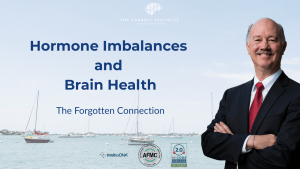Last Updated: October 2025
Most people think of mold as a household nuisance that causes musty smells or allergies. But certain molds release toxic compounds called mycotoxins that can profoundly affect the brain and nervous system. Long-term mold exposure can trigger inflammation, hormone disruption, and cognitive decline that mimic Alzheimer’s disease. At The Carroll Institute in Sarasota, Dr. Garland Glenn, DC, PhD, AFMC identifies and treats mold-related illness as part of a comprehensive, root-cause approach to restoring brain health through The Bredesen ReCODE Protocol and Functional Neurology.
What Are Mycotoxins?
Mycotoxins are toxic chemicals produced by molds such as Stachybotrys, Aspergillus, and Penicillium. These compounds are small enough to enter the bloodstream and cross the blood-brain barrier, where they can disrupt mitochondrial function and trigger neuroinflammation. According to the National Institutes of Health, long-term exposure to mycotoxins may impair memory, attention, and executive function even after environmental exposure ends.
Because mold exposure often occurs indoors—especially in Florida’s humid climate—many patients have no idea their home or workplace is affecting their health. The result is a gradual decline in brain function that’s frequently misdiagnosed as depression, anxiety, or early dementia.
How Mold and Mycotoxins Affect the Brain
When mycotoxins enter the body, the immune system responds by releasing inflammatory molecules known as cytokines. These compounds can cause oxidative stress, mitochondrial damage, and even direct injury to neurons. Over time, this process leads to chronic brain inflammation—one of the most common root causes of cognitive decline.
- Neuroinflammation: Mycotoxins activate microglia (the brain’s immune cells), leading to ongoing inflammation.
- Hormone disruption: Mold toxins interfere with adrenal, thyroid, and sex hormones, worsening fatigue and mood changes. See Hormone Imbalances and Brain Health.
- Mitochondrial damage: Mycotoxins impair energy production, reducing oxygen utilization and brain clarity.
- Immune dysregulation: Chronic exposure can cause autoimmunity or reactivation of latent viruses such as EBV or HSV.
This explains why so many mold-exposed patients experience symptoms like brain fog, light sensitivity, headaches, and poor focus—sometimes years after the initial exposure.
Common Symptoms of Mold-Related Cognitive Decline
- Persistent brain fog or memory lapses
- Unexplained fatigue or low motivation
- Sinus congestion or respiratory irritation
- Sensitivity to light, sound, or odors
- Balance issues, dizziness, or tremors
- Heightened anxiety or irritability
These symptoms often overlap with other root causes such as blood sugar imbalance, toxins, or infections, which is why a full evaluation is so important. Many patients also experience worsening symptoms after moving into a new home, office, or school building—an early warning sign of environmental exposure.
Functional Medicine Testing for Mold and Mycotoxins
At The Carroll Institute, Dr. Glenn uses advanced laboratory testing to identify mold-related toxicity, including:
- Urine mycotoxin panels (measuring ochratoxin A, aflatoxin, trichothecenes, and others)
- Inflammatory markers such as C4a, MMP-9, and TGF-beta-1
- Visual contrast sensitivity (VCS) testing for neurotoxic effects
- Environmental assessment of home or workplace air samples
These tests help determine both current exposure and cumulative toxin burden. Once the type and level of mycotoxins are identified, treatment can begin.
The Path to Healing from Mold Toxicity
Healing from mold exposure requires a systematic approach that removes toxins, reduces inflammation, and restores cellular and neurological function. Dr. Glenn’s protocol typically includes:
- Elimination of exposure: Identify and remediate the source of mold in your environment.
- Detoxification support: Nutritional binders, glutathione, and liver support aid toxin removal.
- Anti-inflammatory nutrition: A low-carb, anti-inflammatory diet reduces oxidative stress.
- Hormone and immune balancing: Addressing adrenal and thyroid function improves resilience.
- Functional Neurology therapies: Neurorehabilitation and photobiomodulation help the brain recover from neurotoxic damage.
Functional Neurology and Neuroplastic Recovery
At the brain level, mold-related inflammation disrupts communication between neurons and weakens sensory processing. Functional Neurology exercises retrain these networks through visual, vestibular, and cognitive drills. The Neuronic Photobiomodulation Helmet is also used to improve oxygenation and mitochondrial function, accelerating recovery from neurotoxic injury.
Over time, this approach helps rebuild lost pathways—a process known as neuroplasticity—allowing patients to regain clarity, focus, and emotional stability.
ReCODE and the Toxin Subtype of Cognitive Decline
In the Bredesen ReCODE Protocol, toxin exposure is one of the key subtypes of cognitive decline. Identifying and removing environmental toxins like mold and heavy metals is essential for successful recovery. Many patients who address mold toxicity report measurable improvements in memory, energy, and mood within months.
Take Control of Your Environment—and Your Brain Health
If you suspect mold may be affecting your memory or mood, don’t wait. Environmental toxicity can be reversed when identified early. Book a Discovery Call with The Carroll Institute today to learn how Functional Medicine and Functional Neurology can help you detoxify your body and restore your brain’s natural balance.
Sources
- Rationale for a Multifactorial Approach to Cognitive Decline — NIH (2022)
- Mycotoxin Exposure and Neurotoxicity — NIH (2011)
- Chronic Inflammatory Response to Mold — NIH (2022)
Medically reviewed by Dr. Garland Glenn, DC, PhD, AFMC (Advanced Functional Medicine Clinician)
The Carroll Institute — Sarasota, FL
Learn more about Dr. Glenn’s background and credentials: About Dr. Garland Glenn
This content is for educational purposes only and does not replace personalized medical advice.

Dr. Garland Glenn, DC, PhD, IFM, AFMC
Founder & Clinical Director, The Carroll Institute — Sarasota, FL
Dr. Garland Glenn is a board-certified chiropractic physician and functional medicine practitioner specializing in cognitive health, neurodegeneration, and root-cause medicine. Certified as an AFMC (Advanced Functional Medicine Clinician) and Institute for Functional Medicine (IFM) trained, he has also completed over 500 hours of advanced training in Functional Neurology under Dr. Ted Carrick, founder of the Carrick Institute.
At The Carroll Institute, Dr. Glenn leads Sarasota’s only ReCODE-certified Functional Neurology program, helping patients reverse or prevent cognitive decline through the Bredesen ReCODE Protocol, neuroplasticity exercises, and personalized functional medicine care.
Learn more about his background and approach at About Dr. Garland Glenn.
– schedule now –
free discovery call
To help you get started, we offer a free 20-minute Discovery Phone Consultation. During this call, you will be able to talk with one of our Certified Brain Health Coaches about what going on with you or your loved one and find out if we can help. Please review our FAQs prior to scheduling your free call. We look forward to talking with you soon and helping you Save Your Brain.
(yes, it’s totally free!)
ReCODE® is a registered program developed by Dr. Dale Bredesen and licensed through Apollo Health. Dr. Garland Glenn is a certified ReCODE practitioner.



